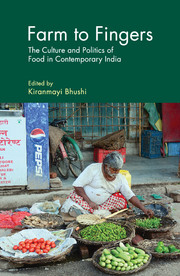Book contents
- Frontmatter
- Dedication
- Contents
- List of Figures and Tables
- Preface
- 1 Introduction
- 2 The Making of ‘Edible Animal Source Foods’ and its Contemporary Reality in Delhi
- 3 Appropriating the Cow: Beef and Identity Politics in Contemporary India
- 4 Eating Akhuni in India
- 5 Health, Standardization and ‘Bengali’ Sweets
- 6 Treating Children, Feeding Junk Food: An Inquiry into a Middle Class Project
- 7 Diaspora Dish: Cooking, Writing, and Creating Identities in Food-blogs
- 8 Measuring Hunger: Debates on an ‘Adequate’ Diet in Colonial North India
- 9 Managing Food: India's Experience with the Public Distribution System
- 10 Food Sovereignty: The Future of Food
- Contributors
- Index
10 - Food Sovereignty: The Future of Food
Published online by Cambridge University Press: 05 July 2018
- Frontmatter
- Dedication
- Contents
- List of Figures and Tables
- Preface
- 1 Introduction
- 2 The Making of ‘Edible Animal Source Foods’ and its Contemporary Reality in Delhi
- 3 Appropriating the Cow: Beef and Identity Politics in Contemporary India
- 4 Eating Akhuni in India
- 5 Health, Standardization and ‘Bengali’ Sweets
- 6 Treating Children, Feeding Junk Food: An Inquiry into a Middle Class Project
- 7 Diaspora Dish: Cooking, Writing, and Creating Identities in Food-blogs
- 8 Measuring Hunger: Debates on an ‘Adequate’ Diet in Colonial North India
- 9 Managing Food: India's Experience with the Public Distribution System
- 10 Food Sovereignty: The Future of Food
- Contributors
- Index
Summary
Introduction
The human relationship to food is inextricably linked to land, water, animals and sustenance of life on Earth. The Austrian-born American physicist Fritjof Capra defines food as – ‘food should be natural consisting of organic food elements in their natural, unaltered state; it should be whole, complete and unfragmented, neither refined nor enriched; and it should be poison-free, organically grown, free from poisonous chemical residues and additives’ (Capra 1982). Our relationship with food and food systems1 today, however, is quite far from this definition. In fact, today's food system is increasingly treating food as a priced commodity. It is resource intensive, industrialized, export-oriented and dominated, and shaped by an amorphous entity called the market where production and consumption of food is dictated by a few large corporations.
According to the Food and Agriculture Organization (FAO), global agriculture has grown 2.5 to 3 times over the last 50 years, which has led to a situation where overall, there are enough calories produced per capita amounting to 2,800 calories per day for ‘every man, woman and child’ (FAO 2011; Small Planet Institute 2014). In spite of this, hunger and malnutrition2 are increasing in the world. Today there are 842 million hungry people in the world. India has the world's largest number of food insecure people and, ironically, the largest number of farmers (OECD/FAO 2014). Most of the hungry and undernourished people in India and across the world are from marginalized sections of society such as small farmers, indigenous people, women and children (Lang 2004; Nestle 2013). At the other end of the socio-economic scale there are obesity, hypertension, diabetes and other non-communicable diseases brought on by overconsumption of processed food, fast-foods, and imported fruits and vegetables. This is happening both in countries of the Global North and South. With increase in income levels among the middle class in developing countries, food habits are changing. There is an increase in consumption of dairy, meat and processed foods, all of which is encouraged by the dominant food system (Delgado 2003; WHO).
- Type
- Chapter
- Information
- Farm to FingersThe Culture and Politics of Food in Contemporary India, pp. 236 - 268Publisher: Cambridge University PressPrint publication year: 2017

